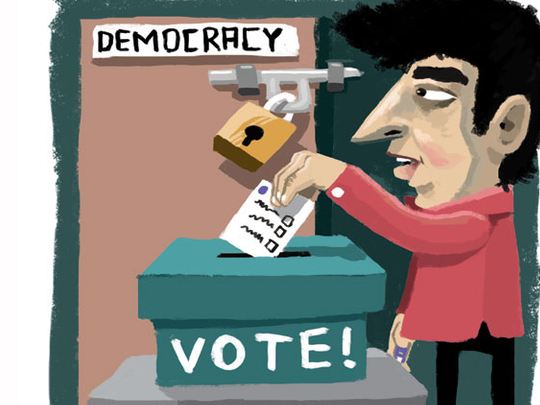
At the May 2004 Arab Summit in Tunis, the final communiqué was delayed for hours as state representatives wrangled over the wording of the point which talked about the need for political reforms in the Arab world.
Wary of the reaction of the ultra-conservative religious establishment in his country, the Saudi representative insisted on removing the word ‘democracy' from the Arabic text. Finally, the Saudi delegation prevailed and the word ‘democracy' was replaced by the word ‘modernisation'. In the English text, however, which was probably aimed at those outside the region, the words ‘democratic practice' were mentioned at the end of the document.
The final document called on Arab leaders to "endeavour, based on the Declaration on the process of reform and modernisation in the Arab world, to pursue reform and modernisation in our countries, and to keep pace with the rapid world changes."
The call for political reforms at an Arab summit was an unusual step for those who follow these ceremonial meetings closely. Political reforms are considered "an internal affair" of Arab states in which the Arab League never dares to venture.
The motive however was clear to those who were familiar with the preparations of that particular summit. An Arab diplomat attending the summit told me (I was reporting on the meeting for Gulf News) to "carefully read" the now-famous speech by then US President George W. Bush a year earlier.
On November 6, 2003 Bush marked the 20th anniversary of the National Endowment for Democracy in Washington with a promise to make the spread of democracy in the Arab world a priority for his administration and "[the] focus of American policy for decades to come."
He effectively chastised Middle Eastern governments for restricting the political and social freedoms of their citizens who, like all other peoples in the world, have "the ability and the right to be free."
Arab states were hardly able to shrug off the Bush talk. It was the aftermath of the September 11 terrorist attacks. The 19 hijackers were Arabs, from countries where the lack of democracy allowed religious extremism to take over the popular psyche, according to the conclusion of Bush's neo-con inner circle.
Arab governments also went into top gear trying to figure out what went wrong and how to convince the rest of the world, mainly America, that they had nothing to do with the Mohammad Atta and Co. The word reform was thus born.
We began hearing about education reforms, economic reforms, social reforms and of course the much-touted political reforms. The 2004 meeting in Tunis was supposed to draw up a plan, despite the objections of some who didn't want to be perceived as acting under pressure from the Bush administration.
In the months that followed the summit, elections were held in a number of Arab countries. ‘Landmark' polls were announced by other countries, like Qatar and Saudi Arabia. But they never materialised. Nevertheless, ‘reforms' became the buzz word in regional political conferences and media shows. Newspapers editorials, even in countries still ruled by military officers, called for political reforms and democratisation. It was an interesting time in the Arab world.
Few people however remembered the objection of the Saudi diplomat to the word ‘democracy' at the Tunis meeting. He objected for the wrong reasons. But six years later, he was proved right.
It is true that in some parts of the Arab world we have regular elections. and in some countries, we have vibrant parliamentary debates. It is also true that we have elected legislators who question government officials and have had parliaments that dismissed ministers. But the fact is that we don't have democracy. Actually, many in the region are surely kidding everybody else when they talk about the ‘democratic march.' The ever-realist Saudis meanwhile realise it takes more than elections for societies to be democratic.
Aristotle, whose definition of democracy is the most accepted, said that electing the government is the natural result of a democracy. Democracy for him was the principles of liberty, justice and equality.
Take a quick look around, at all Arab societies. There is hardly any system that can claim to subscribe to the democratic principle. True, we had elections in Bahrain just yesterday, and they were largely fair and transparent, and will have elections in Egypt and Jordan next month. But in all Arab states, the democratic process has a very long way to go.
Suicide missions
In those and other Arab societies women are yet to be treated equally. Minorities are being discriminated against. The judiciary mostly favours those at the top. Investigating and punishing corruption is almost a mission impossible — in some countries it is a more like a suicide mission. Human right defenders are being jailed. A completely free press is unheard of. And above all, freedom of thought and creed basically doesn't exist.
Therefore, society cannot claim to be democratic when its justice system rules that the wife of Egyptian author Nasr Abu Zeid must divorce him, against her will, because he questioned the application of some aspects of today's radicalised version of Islam. Societies where people's citizenship is revoked because they committed crimes cannot claim to be democratic. Societies that tolerate child brides cannot claim to be democratic.
The US promise, declared by Bush in 2004, has long faded. American pragmatism prevailed as always. Nevertheless, many Arab states continue to hold regular elections. The results of many of those are determined in advance. But it feels good to see from time to time pictures of men and women holding up fingers, stained by the now famous purple ink after casting their ballot. But will that bring democracy?
Sceptics say it might never happen. Others, the hopefuls among us, would like to think that one day Arabs will rightly claim to be democratic. But it will take more than purple ink and the ballot box.












